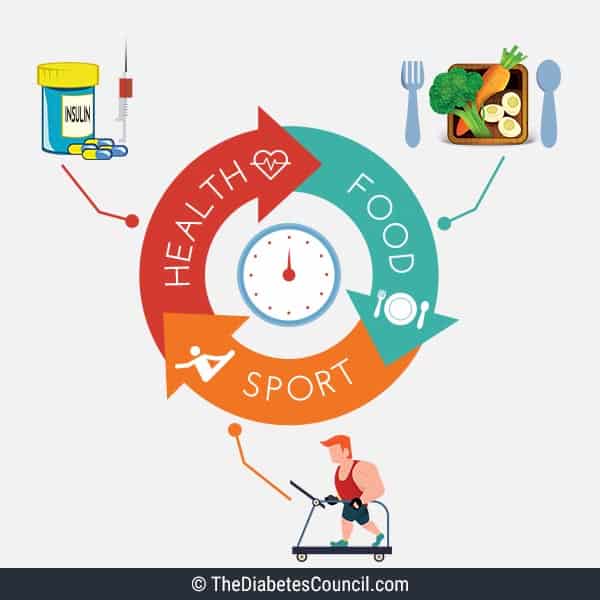Exercise and increased physical activity is always recommended by doctors for patients with diabetes as a way to help lower their blood glucose levels and provide them with better control. Any everyone knows that exercise and increased activity levels are good for anyone, but it’s particularly important for people with diabetes. Exercise not only is great in helping provide control over blood glucose levels but it is also good for boosting your mood, confidence, your heart health and more.
Whether you are participating in a team sport or just increasing your activity levels on your own, proper planning ahead is key to diabetes management, for more information read our article Everything You Need To Know About Being An Athlete With Diabetes. Blood sugar levels can drop drastically both during and even hours after exercise, so it’s important to be prepared.
Preventing Low Blood Sugars
Exercise and increased activity such as sports can cause your insulin sensitivity to increase. This results in a higher risk for low blood sugars after each time you exercise. In order to prevent these situations from occurring you will want to ensure the proper planning and steps are in place ahead of time. Here are some tips that can help you to prevent low blood sugars from occurring during and after exercise:
- Determine your last dosage of insulin before the activity begins. You will want to pay attention to if your activity time will be during the insulin’s peak time. This could put you at a much higher risk for going low.
- Don’t exercise if you have ketones. When you have ketones and exercise the levels of ketones in your body may actually get much higher and potentially put you into DKA.
- If you are low before beginning your activity you will want to first, ensure your blood sugar has risen to an appropriate level. You may even want to eat a snack prior to beginning, this will depend on how your body reacts to any increase in activity levels and the activity you are participating in.
- Be sure to pack a bag with all your low treatments and keep it near you during your activity.
- Check your blood sugar often especially after you exercise and remember that the effects of any activity can last for almost 24 hours after the activity has ended. We like to refer to these lovelies as delayed lows.
- Be sure to break often to check your blood sugar during the activity and treat accordingly.
I suggest reading the following:
What Happens to Your Body When You Exercise?
Your muscles require much more energy when you are working out, because of this the body will begin to release extra glucose in the body. When you have diabetes this can have some serious side effects on you. If your body doesn’t have the proper amount of insulin when the glucose releases, this can cause your blood sugar levels to rise and stay in your blood for some time.
When you do not have enough insulin in your body your body will start to burn your fat for fuel. This can lead to the development of ketones in the blood. Ketones can make you very sick and may require medical treatment if not handled in a timely manner. This is why it is extremely important to test for ketones before you begin any activity.
The additional need for glucose during physical activities can also cause you to experience low blood sugars. This happens when the body uses up all the glucose in your system, and more is demanded from your muscles. If you are thinking about participating in a rigorous activity, it’s important to speak with your doctor prior to starting so that you can determine the proper treatment plan.
Before You Exercise
Before beginning any sports, you will want to make sure you have a checkup at your doctors. This will help to determine what your current health situation is prior to beginning. The doctor can also discuss at this time with you how you may change your insulin routine when working out. Learn more on how to build your perfect diabetes care team.
If you are participating in a team sport or your child is, you will want to speak with the coaches ahead of time so that they understand that diabetes is in the mix and what to watch out for if you or your child should experience a high or low blood sugar.
Diet Plan and Sports
Your doctor will also work with you to adjust your diet and meal plan to help provide any extra energy your body may require during periods of physical activity. They may recommend you take extra snacks before you begin, during the activity and even after to help combat those delayed lows. Low and high blood sugar can interfere with your ability to participate in team and solo sports so it’s important to try to prevent them before they happen. Extra water is another vital essential during periods of activity levels. This is because your body can become easily dehydrated when you sweat. Ensure you are keeping up with your hydration levels by keeping water handy and drinking it often.
Further reading:
Remember not to beat yourself up if you experience any mishaps in your diabetes treatment during sports and periods of physical activity. No matter how diligent we are there still are times that diabetes doesn’t play fairly, at no fault of your own. If you love sports you don't have to limit yourself because of diabetes but just prepare yourself the right way!
TheDiabetesCouncil Article | Reviewed by Dr. Sergii Vasyliuk MD on June 01, 2020









